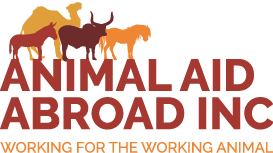MAWS reflects on work done in 2018
Mwamfumba Multipurpose Cooperative Animal Welfare Society (MAWS) in Zambia - Final report for 2018.
The work that Mwamfumba Animal Welfare Society does is never over and has far reaching impact for many communities and their animals, other societies and other welfare organisations both nationality and internationally.
2018 was a very busy year for the group and while challenges were met during the past year, they also celebrated some victories for the animals. Where battles were lost (outbreaks of diseases such as FMD and corridor diseases), they have not closed the chapters but have instead reinforced their commitment to finding ways to bring about effective change in the district. Change, not only in improving the standards of care, but also changes in altitudes displayed towards animals.
The rains have now started and there are downpours nearly every second day. Because of the rains, the working donkeys and oxen are always very busy in the field ploughing, transporting farm inputs and in other places, farming produce from irrigation. December is a very busy month for working animals and so is January and February for weeding and transporting goods. The lives of the locals are inexorably linked with those of animals, whether they are farmed, worked or kept as companions in homes across Zambia. In working towards improving the lives of working animals MAWS aim to nurture fellow Zambians to extend their compassion to other beings who share our world, fostering tolerance and sensitivity.
MAWS' mobile veterinary clinic is always very busy in the field uplifting standards of care and unsuitable harnessing is removed and destroyed while the donkeys and owners benefit from the replacement humane harnessing. Carts, ploughs and other implements are inspected, repaired and all of this together results in the donkeys being worked in equipment that does not cause harm, injuries and pain.
During the month of December 2018 and during the mobile clinic MAWS were able to reach 545 donkeys, deworm them all and treat 7 with wounds, 3 with diarrhea , 6 with eye infection, and 4 births with no deaths recorded.
MAWS also controlled ecto-parasites by spraying and administering invermectine 1% to control the ticks and other biting flies. MAWS reached 1,014 working oxen and bullocks, and they were all dewormed and sprayed or dipped once a week to avoid and control the outbreak of tick borne diseases which happened in October 2018. 798 were treated against tick-borne disease, in particular corridor disease. The disease now is under control and MAWS are busy monitoring the farmers on a regular basis to see to it that they follow the correct procedure of animal health and welfare.
MAWS sadly came across two cases of injury caused by beating while ploughing in the field. To try and encourage a generational shift in mindset on this, MAWS reached out to 950 primary school students and taught them about animal welfare and health.
MAWS look forward to seeing more successes in the year 2019 as they continue to improve the lives of all working animals and to help other societies to perform optimally in animal welfare.
MAWS send their thanks to Animal Aid Abroad donors who have so very generously supported their work in the rural villages of the Chibombo district.
